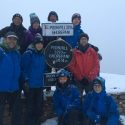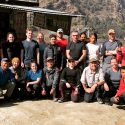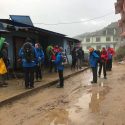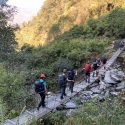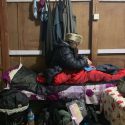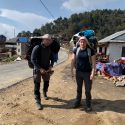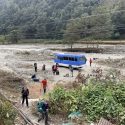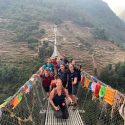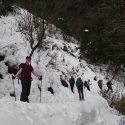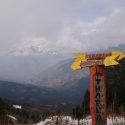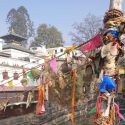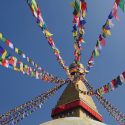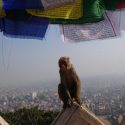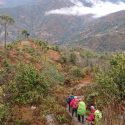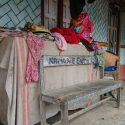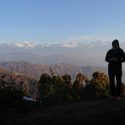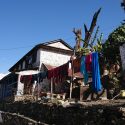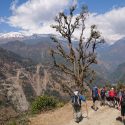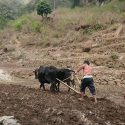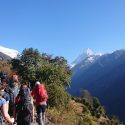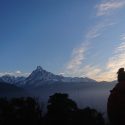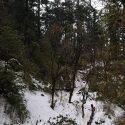A NEPALESE ODYSSEY
As the new year dawned 14 members of 2 Medical Brigade prepared for an expedition to the world renowned Langtang Valley in Nepal. This was the first time 2 Medical Brigade had run an expedition to Nepal and the first time many of the group had been to Nepal. During the expedition five party members were awarded Summer Mountaineering Foundation (SMF) awarded through distributed training. Four other party members who hold SMF and three additional party members who hold MLT qualifications gained valuable log book days and enhanced their navigation and group management skills in an unfamiliar environment. These are essential skills needed to progress in the Mountain Leader Scheme.
After a 13 hour from Manchester to Kathmandu via Abu Dhabi we were transported to a hotel in central Kathmandu. The planning for the trip had understandably taken place in the UK and on arrival in Nepal the brief from the trekking company informed us that it had been unseasonably snowy for this time of year, with snow as low as the Kathmandu foothills. With our military adventurous training summer remit in mind we set off to the Hemblu area with plans to trek across to the Langtang region. By day 3 weather reports and communication from onward tea houses suggested two foot of fresh snow on our planned route. Decisions had to be made and strong leadership and resolve was demonstrated by turning back, to attempt a different trek, rather than ‘soldier on’ and risk falling into that heuristic trap of ‘commitment’. This is where groups continue with a plan because they’ve committed to it even though everything suggests they shouldn’t, and they end up placing themselves in unnecessary risk and danger.
Back in Kathmandu plan B, already considered in the UK, to attempt Annapurna Base Camp (ABC) from the Pokhara region was put into place. After an 8-hour bus journey and a good night’s sleep we set off from Phedi. As the weather was so changeable the plan allowed us to trek for three days to Chromrong before we had to decide to push onto 4130 metres at ABC or head west to the lower summit of Poon Hill at 3210 metres. Reports back from returning travellers told us that there was far too much snow on the ABC route to carry on higher and again strong leadership was demonstrated to opt for plan C, the route that complied with the exercise leader’s remit.
On day 7 of the new trek the team summited Poon Hill at 3210 metres for the sunrise, only to be met with dense cloud cover and no view of the surrounding area. We trekked downhill for a further two days to the pickup point at Neypal where the bus was waiting to transport us to Pokhara, where we visited the Gurkha Museum prior to travelling back to Kathmandu for the return trip to the UK.
Despite the setbacks there was much to be taken from the trip. Key points that adaptability and several good back up plans are pivotal in ensuring a successful adventurous training trip. Sometimes the best decision for the group is not always popular but better to be safe than over commit individuals to an environment they have not been prepared for. As the nineteenth-century Prussian military commander Helmuth van Moltke said, ‘No plan survives first contact with the enemy’.
“Nepal was my first expedition with the army so I learnt a lot from the experience. I gained my summer mountain foundation qualification and aim to progress through my mountain leader qualifications. As a group we faced various challenges which demanded flexibility and dynamic risk assessments as weather conditions put hold to plans A and B. Through this I have gained a great insight into the expedition planning process which is a role of which I am going to progress into within my unit. I plan to complete my unit adventure training officers course and plan expeditions for personnel within my unit to enable them to benefit from such experiences.”
2Lt Andrea Swan – 208 Field Hospital
“Nepal was my second expedition with the army. I have previously taken part in an army expedition to the USA where I obtained my summer mountain foundation qualification. Since then I have been obtaining my quality mountain days so I can progress further to obtain my mountain leader training qualification and work towards becoming an instructor. Nepal has developed my expedition planning and the risk assessments needed for mountaineering. I am currently planning a unit expedition to the Dolomites, Italy this summer (Aug 19) to allow fellow members of my unit to experience what I have. I also aim to develop each of the individuals on this unit expedition with the aim of them all achieving the summer mountain foundation qualification I already hold. This will further develop the unit in obtaining instructors for the future. I have also started planning with my partnering unit (212 Field Hospital) with the aim of a joint expedition to Patagonia in Jan 2021.
“Being a junior rank (Cpl) in the army reserves, planning expeditions is very new to me, as this planning phase is normally constructed by a senior soldier or officer. This will be very developmental for me personally and I am very appreciative of the support that is made available to me. I have been aware of the support from Ulysses trust to army expeditions and planning. My intention is to approach the Ulysses trust in future for support on expeditions and would greatly appreciate the additional help to complete these expeditions to their full potential.”
Cpl King – 207 Field Hospital
“We as Headquarters 2 Medical Brigade demand a lot from our Reserve personnel, having this opportunity to take part in an Expedition to Nepal is not only good for individual development but good for the service. The retention aspect is enormous for our units as we are seen to be delivering on one of the many offers/promises individuals are given when they join the Army Reserves. All expedition participants are keen to develop their mountain skills and progress through the Mountain Leader Training Scheme which will benefit both the individual and their Unit. A number of individuals have already volunteered to take on additional rolls within their units, this includes becoming the Unit Adventure Training Officer and organising adventurous training weekends and future unit expeditions. Units can see that the impact on the individuals of all ranks has been very positive which is precisely what we are all striving to achieve.”
WO1 Stephen Ashcroft – HQ 2 Medical Brigade
Written credit: Captain Leckie and Lance Corporal McElhinney

